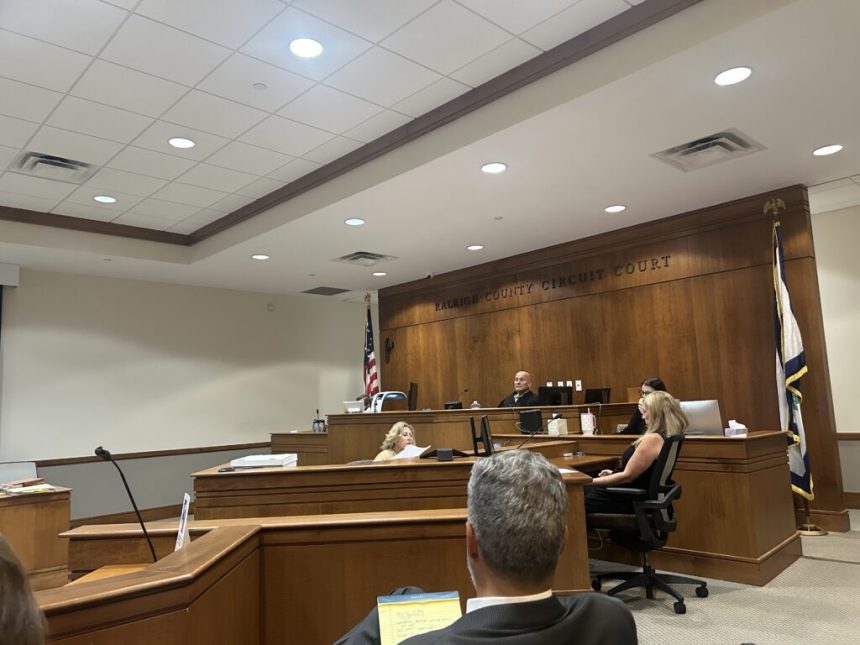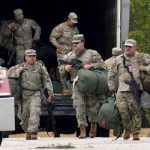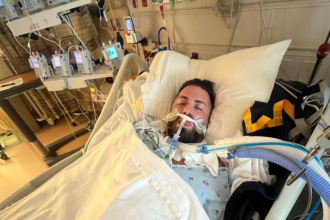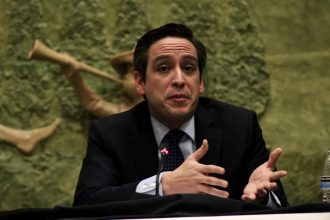State epidemiologist Shannon McBee testifies before Raleigh County Circuit Court on Wednesday. (Photo by Lori Kersey/West Virginia Watch)
Beckley, W.Va. — A judge overseeing two consolidated lawsuits in a legal battle over West Virginia’s school vaccine law and religious freedom will consider every family that has asked for a nonmedical exemption to the law together as a party to the lawsuit, and he expects to issue a statewide ruling, he said Wednesday.
Raleigh County Circuit Judge Michael Froble granted a motion certifying class action in the case of Miranda Guzman and other Raleigh County families suing the West Virginia and Raleigh County boards of education to make them recognize religious exemptions to the shots.
Ruling from the bench Wednesday, Froble said he believes the case before him is about the state Board of Education’s uniform policy not to accept nonmedical exemptions.
“One of the issues, I guess, to address is the parties have argued back and forth as to whether this court can do anything outside of Raleigh County, and the court believes it can and will, depending upon the evidence in the case,” Froble said. “It does have the jurisdiction to issue a statewide injunction and or declaratory judgment against the state Board of Education.”
Froble ruled in July that students who are party to the case may attend school with a religious exemption. That ruling applied only to those students. Wednesday’s hearing was a continuation of a hearing on permanent injunction the court began in September.
A state health official testified Wednesday that the health department has fielded about 575 requests for nonmedical exemptions to the vaccine law, all of which have been approved.
One of the reasons a class action lawsuit makes sense, the judge said, is to prevent potentially all of those cases being brought individually against school officials all over the state.
“That would be a nightmare, because, not only the possibility of inconsistent decisions, but it’d be difficult, because the plaintiffs in a lot of these cases would have to probably go pro se,” he said. “[They w]ould not have the benefit of counsel, even though the [Equal Protection for Religion Act] does allow awarding of attorney fees.”
Froble further ruled that everyone who has asked the state for a religious, philosophical or conscientious objection exemption to the state’s vaccination requirements should be considered parties to the case. There should be no difference between religious and philosophical exemptions, he said. During the September hearing, the judge asked parties to submit briefs on their opinions of how the religious freedom bill should apply to philosophical objections.
All states require students to be vaccinated against a number of infectious diseases, like measles, chickenpox and polio. West Virginia has been one of only five states in the country that have not allowed nonmedical exemptions to the requirements.
Gov. Patrick Morrisey seeks to change that. In January he issued an executive order requiring the state to allow religious exemptions. His order is based on a 2023 religious freedom law. Morrisey has not rescinded the order, even though state lawmakers earlier this year voted down a bill that would have inscribed the exemption in law.
The state board of education earlier this year directed county boards not to accept nonmedical exemptions.
During testimony Wednesday, state Board of Education President Paul Hardesty told the court, among other things, the state’s Equal Protection for Religion Act is not part of the laws that govern schools in the state.
It also heard from state epidemiologist Shannon McBee. McBee said she and her staff developed the nonmedical exemption procedures following Morrisey’s executive order in January.
McBee said that though the state’s religious freedom law was passed in 2023, the health department did not establish a process for nonmedical exemptions prior to Morrisey’s executive order because “the government has a compelling interest in public health.”
McBee acknowledged that other states and branches of the military have mechanisms to determine if a person seeking a religious exemption has sincerely held religious beliefs. With the governor’s guidance, she said, the state department did not include such a mechanism. The families just have to attest to having a religious objection to vaccines.
The Guzman lawsuit has also been consolidated with one filed against the state health department by two families with school children at higher risk of complications caused by vaccine-preventable illnesses. Plaintiffs in that case are represented by the American Civil Liberties Union of West Virginia and Mountain State Justice.
The hearing is expected to continue Thursday in Beckley with testimony from Dr. Mark McDaniel, the state’s acting health officer.









